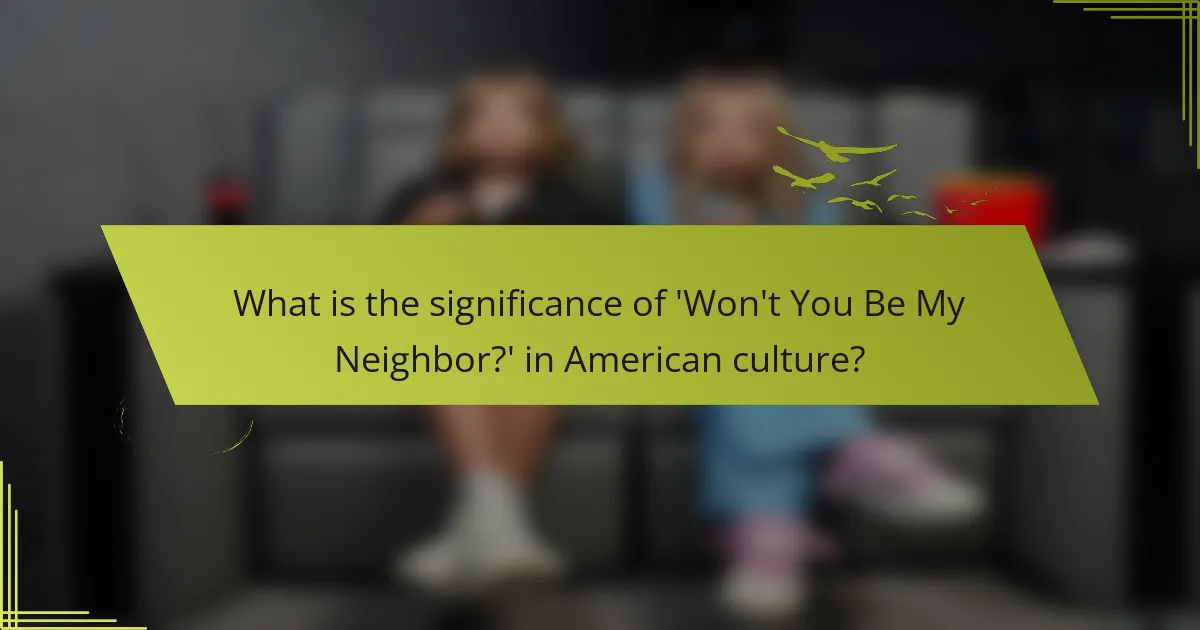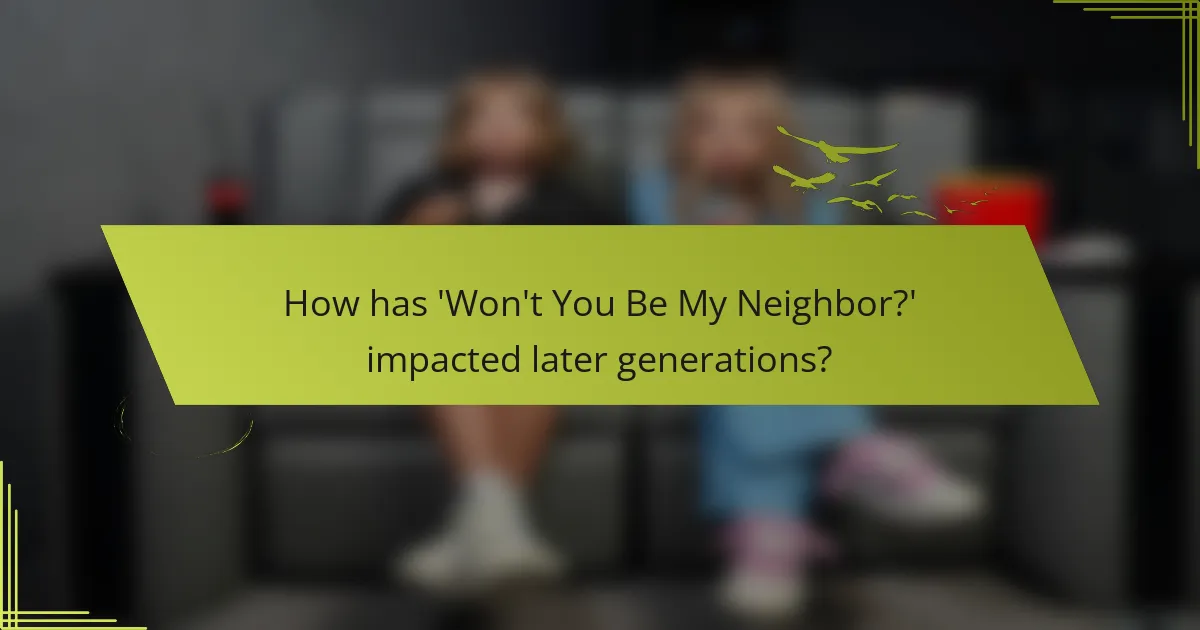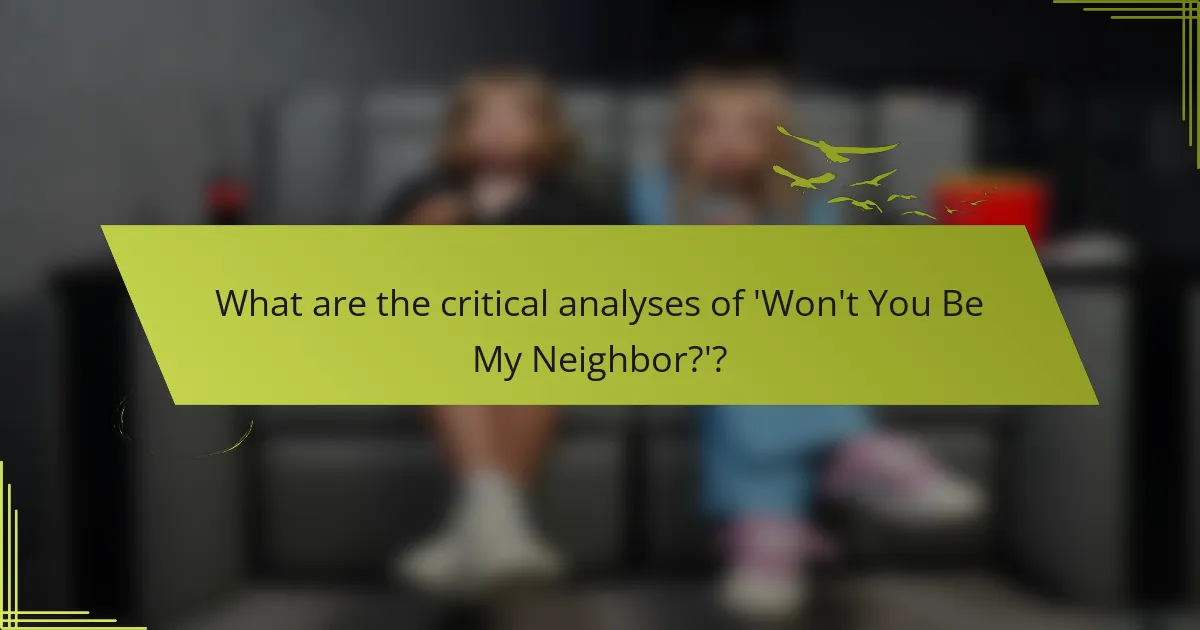
What is the significance of ‘Won’t You Be My Neighbor?’ in American culture?
‘Won’t You Be My Neighbor?’ is significant in American culture as it embodies the values of kindness, community, and acceptance. The documentary highlights the life and philosophy of Fred Rogers, who became a cultural icon through his television show. His approach to children’s programming emphasized emotional intelligence and empathy. The film illustrates how Rogers addressed complex social issues, including diversity and mental health, in a relatable manner. It showcases his belief in the importance of nurturing relationships. The documentary resonated with audiences during a time of social division, promoting messages of love and understanding. Its success reflects a cultural longing for connection and compassion in contemporary society.
How did ‘Won’t You Be My Neighbor?’ influence societal values?
‘Won’t You Be My Neighbor?’ influenced societal values by promoting kindness, empathy, and community engagement. The documentary highlights Fred Rogers’ message of unconditional love and acceptance. It emphasizes the importance of emotional intelligence and understanding others. By showcasing Rogers’ work, the film encourages viewers to reflect on their own relationships. Studies show that media portraying positive social values can lead to increased prosocial behavior. The film’s impact is evident in discussions around mental health and childhood development. It has sparked conversations about the role of media in shaping societal norms. Overall, the documentary reinforces the significance of compassion in everyday life.
What themes are prevalent in ‘Won’t You Be My Neighbor?’ and how do they reflect American culture?
The prevalent themes in “Won’t You Be My Neighbor?” include kindness, acceptance, and the importance of community. These themes reflect American culture by emphasizing the value placed on compassion and neighborly relationships. The film showcases Fred Rogers’ dedication to fostering emotional intelligence in children. It highlights the need for understanding and empathy in a diverse society. The documentary also addresses social issues such as racism and mental health. It illustrates how Rogers used his platform to promote inclusivity and love. By doing so, it mirrors the ongoing American struggle for equality and understanding among different communities.
How did Fred Rogers’ philosophy shape public perceptions of kindness and community?
Fred Rogers’ philosophy emphasized the importance of kindness and community. He believed in the value of every individual and promoted empathy through his television program. Rogers consistently addressed emotional intelligence and interpersonal relationships. His message resonated with audiences, fostering a sense of belonging. This approach encouraged viewers to practice kindness in their daily lives. Research shows that his teachings influenced generations, shaping societal norms around compassion. The impact of his work is evident in the continued emphasis on kindness in children’s programming today.
What historical context surrounds ‘Won’t You Be My Neighbor?’?
‘Won’t You Be My Neighbor?’ is a documentary about Fred Rogers and his television program, ‘Mister Rogers’ Neighborhood.’ The film was released in 2018, coinciding with a renewed interest in Rogers’ legacy. The historical context includes the cultural landscape of the 1960s and 1970s in America. This era was marked by social upheaval, including civil rights movements and anti-war protests. Rogers’ program aimed to promote kindness and understanding amidst societal challenges. The show addressed complex issues such as death, divorce, and disability in a child-friendly manner. Rogers’ approach was revolutionary for children’s television, emphasizing emotional intelligence and empathy. The documentary highlights the significance of his message in today’s divided society. It serves as a reminder of the importance of compassion and community.
How did the socio-political climate of the 1960s and 1970s influence the show’s content?
The socio-political climate of the 1960s and 1970s significantly influenced the show’s content. During this period, America faced civil rights movements, anti-war protests, and a push for social change. The show addressed themes of inclusion, kindness, and understanding, reflecting the desire for societal harmony. It presented diverse characters and tackled complex issues like race and disability. This approach resonated with an audience seeking comfort amid turmoil. The show’s creator, Fred Rogers, aimed to foster emotional intelligence in children. His messages aligned with the broader cultural shifts toward empathy and social responsibility. This alignment made the show a vital part of American children’s programming during that era.
What role did television play in American families during the show’s airing?
Television served as a central medium for family bonding during the airing of ‘Won’t You Be My Neighbor?’. It provided a shared experience that brought family members together in the living room. The show promoted values of kindness and understanding, reinforcing positive social behaviors. Families often discussed the themes presented in the episodes, fostering communication among members. Research indicates that children’s programming, like this show, influenced social development and emotional learning. The show’s accessibility made it a staple in many American households, creating a sense of community. This collective viewing experience contributed to shaping cultural norms and values during that era.

How has ‘Won’t You Be My Neighbor?’ impacted later generations?
‘Won’t You Be My Neighbor?’ has significantly influenced later generations by promoting empathy and kindness. The documentary highlights Fred Rogers’ philosophy of unconditional love and acceptance. This message resonates with young viewers, shaping their understanding of emotional intelligence. Research shows that children exposed to such values exhibit greater compassion and social awareness. The film also revitalized interest in children’s programming that prioritizes emotional well-being. As a result, many educators and parents now emphasize emotional literacy in childhood development. This cultural shift demonstrates the lasting impact of Rogers’ teachings on contemporary society.
What lessons can modern audiences learn from ‘Won’t You Be My Neighbor?’?
Modern audiences can learn the importance of kindness and acceptance from ‘Won’t You Be My Neighbor?’. The film showcases Fred Rogers’ commitment to fostering emotional intelligence in children. It emphasizes the value of empathy and understanding in building community. The documentary highlights how Rogers addressed complex social issues with compassion. His approach encourages open dialogue about feelings and difficult topics. This resonates with contemporary audiences seeking connection in a divisive world. The film also illustrates the power of media to positively influence society. By promoting love and respect, it inspires viewers to contribute to a more caring environment.
How have contemporary children’s programs adopted themes from ‘Won’t You Be My Neighbor?’?
Contemporary children’s programs have adopted themes from ‘Won’t You Be My Neighbor?’ by emphasizing kindness, community, and emotional intelligence. Shows like ‘Daniel Tiger’s Neighborhood’ directly reference Mr. Rogers’ lessons on empathy and understanding emotions. They incorporate social skills through relatable storylines and character interactions. This approach mirrors the original show’s focus on nurturing relationships and fostering a sense of belonging. Additionally, programs like ‘Bluey’ promote family values and problem-solving in everyday situations, reflecting the essence of Mr. Rogers’ teachings. These adaptations demonstrate the lasting influence of Mr. Rogers’ philosophy on modern children’s programming.
What is the legacy of Fred Rogers in today’s educational landscape?
Fred Rogers’ legacy in today’s educational landscape emphasizes emotional intelligence and inclusivity. His approach encourages educators to prioritize social-emotional learning. Rogers advocated for understanding children’s feelings and fostering a nurturing environment. This perspective has influenced modern curricula that integrate emotional development. Research shows that social-emotional learning improves student outcomes and well-being. Programs inspired by Rogers’ philosophy promote kindness and empathy in classrooms. His legacy continues through initiatives that support mental health and emotional growth. Fred Rogers remains a pivotal figure in shaping compassionate educational practices.
How does ‘Won’t You Be My Neighbor?’ continue to resonate today?
‘Won’t You Be My Neighbor?’ continues to resonate today by addressing themes of kindness, empathy, and community. These themes are increasingly relevant in today’s polarized society. The film highlights Fred Rogers’ message of acceptance and understanding. This message encourages viewers to foster connections across differences. The documentary’s release during a time of social unrest amplified its impact. Many people seek comfort in Rogers’ philosophy amid contemporary challenges. The film’s success reflects a collective yearning for compassion in public discourse. Overall, it serves as a reminder of the importance of nurturing neighborly relationships.
What are the current discussions surrounding kindness and community in relation to the show?
Current discussions surrounding kindness and community in relation to “Won’t You Be My Neighbor?” emphasize its role in promoting empathy and social connection. The show highlights the importance of treating others with respect and understanding. Many viewers discuss how Fred Rogers’ messages encourage building supportive communities. This is particularly relevant in today’s divisive social climate. Recent studies show that programs focusing on kindness can positively impact mental health and community cohesion. The show’s legacy continues to inspire initiatives aimed at fostering kindness in various settings. Overall, the discussions reflect a desire for more compassionate interactions in society.
How do modern adaptations or tributes reflect the show’s enduring relevance?
Modern adaptations and tributes reflect the show’s enduring relevance by showcasing its core themes of kindness and community. These adaptations often reinterpret the original message for contemporary audiences. They highlight the importance of empathy in today’s society. For example, recent tributes have included social media campaigns that promote neighborly love and support. This demonstrates that the show’s ideals resonate with current social issues. Additionally, modern adaptations often incorporate diverse voices and perspectives, making the content relatable to a broader audience. This approach reinforces the show’s universal appeal and timelessness. Furthermore, the continued popularity of the show’s original content in various formats, such as documentaries and podcasts, indicates its lasting impact on American culture.

What are the critical analyses of ‘Won’t You Be My Neighbor?’?
Critical analyses of “Won’t You Be My Neighbor?” focus on its portrayal of Fred Rogers and the impact of his message. The documentary highlights Rogers’ emphasis on kindness and emotional intelligence. Critics note its exploration of the socio-political climate during Rogers’ career. The film connects Rogers’ teachings to contemporary issues like divisiveness and mental health. Some analyses praise its nostalgic elements while others critique its lack of depth in certain areas. The film’s use of archival footage supports its narrative, showcasing Rogers’ genuine connection with children. Overall, the documentary serves as a reflection on compassion in American culture.
How do scholars interpret the show’s cultural impact?
Scholars interpret the show’s cultural impact as a significant influence on American values and social norms. They argue that it promoted themes of kindness, acceptance, and community engagement. Research shows that the show fostered emotional intelligence in children. It addressed complex social issues like diversity and disability in an accessible manner. The program’s host, Fred Rogers, became a cultural icon representing empathy. Scholars highlight its role in shaping public discourse around childhood development. Studies indicate that the show’s messages resonate across generations, reinforcing its lasting relevance. Overall, the cultural impact is seen as a transformative force in American media and education.
What critiques have been made regarding the show’s approach to difficult topics?
Critiques of the show’s approach to difficult topics include oversimplification and lack of depth. Some viewers argue that the show glosses over complex issues. Critics point out that this can lead to misunderstandings. For example, discussions on race and class are often presented in a simplistic manner. This approach may not fully represent the realities faced by marginalized communities. Additionally, some believe the show’s tone can be overly optimistic. This optimism may detract from the seriousness of the issues addressed. Overall, these critiques suggest a need for a more nuanced exploration of difficult topics.
How has the show’s reception evolved over time among different demographics?
The show’s reception has evolved significantly over time among different demographics. Initially, it garnered strong support from children and parents in the 1960s for its educational content. As the years progressed, the show attracted a more diverse audience, including educators and mental health professionals, who appreciated its focus on emotional intelligence. In the 1990s, older generations began to reminisce about their childhood experiences with the show, leading to a resurgence in popularity. Recent years have seen the show embraced by millennials and Gen Z, who value its messages of kindness and community in today’s social climate. This demographic shift is evidenced by increased viewership on streaming platforms and social media discussions. The release of the documentary “Won’t You Be My Neighbor?” in 2018 further solidified its cultural relevance, appealing to a broader audience across age groups.
What practical insights can be drawn from ‘Won’t You Be My Neighbor?’ for today’s audiences?
‘Won’t You Be My Neighbor?’ offers practical insights on empathy and community building. The film emphasizes the importance of kindness in everyday interactions. It showcases Fred Rogers’ approach to addressing difficult topics with compassion. Today’s audiences can learn to foster open dialogues on mental health and social issues. The documentary illustrates the impact of active listening and understanding. Research indicates that empathy can enhance relationships and reduce conflict. By applying these principles, individuals can strengthen their communities. The film serves as a reminder that small acts of kindness can lead to significant societal change.
How can individuals apply the principles of kindness and empathy in their daily lives?
Individuals can apply the principles of kindness and empathy in their daily lives by actively listening to others. This involves giving full attention and understanding their feelings. They can also perform small acts of kindness, such as helping a neighbor or complimenting a colleague. These actions foster a positive environment and strengthen community ties. Practicing gratitude is another way to enhance empathy. Acknowledging the efforts of others builds mutual respect. Engaging in volunteer work allows individuals to connect with diverse groups, enhancing understanding. Studies show that acts of kindness can improve mental health and well-being. Research indicates that empathy can be cultivated through mindfulness practices.
What community-building practices can be inspired by Fred Rogers’ teachings?
Community-building practices inspired by Fred Rogers’ teachings include fostering empathy, encouraging open communication, and promoting inclusivity. Rogers emphasized the importance of understanding others’ feelings. He believed that acknowledging emotions builds stronger connections. Open dialogue allows community members to express themselves freely. This practice nurtures trust and understanding among individuals. Inclusivity ensures that everyone feels valued and accepted. Rogers’ approach to kindness and respect can unite diverse groups. His legacy encourages communities to prioritize relationships and emotional well-being. These practices contribute to a supportive and nurturing environment.
The main entity of the article is ‘Won’t You Be My Neighbor?’, a documentary that examines the cultural significance of Fred Rogers and his television program, ‘Mister Rogers’ Neighborhood’. The article explores the themes of kindness, community, and emotional intelligence emphasized in the film, and how these themes reflect American cultural values. It discusses the documentary’s influence on societal norms, the historical context of its content, and the lasting impact of Rogers’ philosophy on contemporary children’s programming and educational practices. Additionally, it highlights current discussions around kindness and community, as well as critiques of the show’s approach to complex social issues.